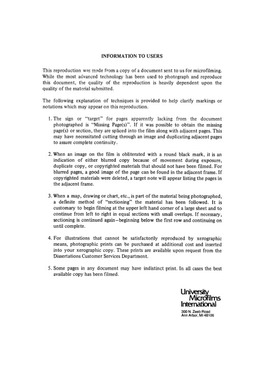| dc.contributor.author | Deloney, Julia Rebecca, | en_US |
| dc.date.accessioned | 2013-08-16T12:28:56Z | |
| dc.date.available | 2013-08-16T12:28:56Z | |
| dc.date.issued | 1983 | en_US |
| dc.identifier.uri | https://hdl.handle.net/11244/5155 | |
| dc.description.abstract | A stepwise discriminant analysis compared the married and divorced educators while a stepwise regression procedure was used to predict marital satisfaction of the married group. Interviews with a small sample of respondents (N = 12) were conducted to support and clarify the results of the statistical analyses. The discriminant analysis resulted in a 92% classification rate and a canonical correlation coefficient of .83. Items differentiating between married and divorced women were attitude toward marriage, occupational level within the teaching profession, personal stress, and how the women thought professional colleagues would rank them in professional ability. The regression analysis resulted in a multiple R of .66. Items contributing significantly to the regression equation were attitude toward marriage, stress resulting from career demands, career versus partner conflict, and occupational level within the teaching profession. | en_US |
| dc.description.abstract | A model emerged from the statistical results and interviews. The major factor determining whether a couple obtained a divorce or remained married or had high or low marital satisfaction was attitude toward the marriage and family. . . . (Author's abstract exceeds stipulated maximum length. Discontinued here with permission of author.) UMI | en_US |
| dc.description.abstract | One hundred sixty women educators were contacted. Seventy-one married women and 67 divorced women responded to the mailed questionnaires. | en_US |
| dc.description.abstract | Two general hypotheses were investigated: (1) what factors differentiate educators in dual-career marriages from educators who were in dual-career marriages but are divorced and (2) what factors predict marital satisfaction in the married group? Specifically, did divorced and married educators differ in career-related stress, personal stress, and style of coping with stress; and did educators currently in dual-career marriages who were high in marital satisfaction and those who were low in marital satisfaction differ in career-related stress, personal stress, and style of coping with stress. | en_US |
| dc.description.abstract | The questionnaire was composed of four instruments; (1) the Family Stress Instrument, developed by the researcher, measured the effect of stress on the marriage/family resulting from career demands, (2) the Schedule of Recent Experiences measured personal stress, (3) the Role-Coping Inventory measured styles of coping with stressful situations, and (4) the Dyadic Adjustment Scale (DAS) measured marital satisfaction. Only the married group responded to the DAS. | en_US |
| dc.format.extent | ix, 213 leaves : | en_US |
| dc.subject | Education, Educational Psychology. | en_US |
| dc.title | Stressors and coping styles of married and divorced dual-career educators. | en_US |
| dc.type | Thesis | en_US |
| dc.thesis.degree | Ph.D. | en_US |
| dc.thesis.degreeDiscipline | Jeannine Rainbolt College of Education | en_US |
| dc.note | Source: Dissertation Abstracts International, Volume: 44-08, Section: A, page: 2411. | en_US |
| ou.identifier | (UMI)AAI8324883 | en_US |
| ou.group | Jeannine Rainbolt College of Education | |
